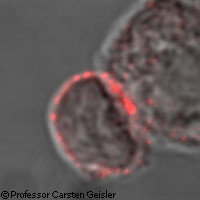More sun means a better immune system
As the human body's defence against infection, T (thymus) cells help keep us healthy by finding and destroying traces of foreign pathogens. But new research from Denmark shows that T cells need healthy doses of vitamin D in the bloodstream so as to kick into action and perform their role properly. This latest breakthrough, details of which are published in the journal Nature Immunology, may help doctors deal with autoimmune reactions and even counteract transplant organ rejection. T cells are a type of white blood cell that perform a central role in the immune system. In order to find, react and fight off various infections in the body, T cells must transform from dormant, harmless cells to active ones capable of killing often serious bacteria and viruses. Scientists at the University of Copenhagen in Denmark have now discovered that vitamin D is critical to T cell function. Without sufficient sources of this vitamin in the blood, say the researchers, the cells remain dormant and are therefore incapable of 'activating' to fight foreign pathogens. 'When a T cell is exposed to a foreign pathogen, it extends a signalling device or 'antenna' known as a vitamin D receptor, with which it searches for vitamin D,' said the university's professor, Carsten Geisler. 'This means that the T cell must have vitamin D or activation of the cell will cease. If the T cells cannot find enough vitamin D in the blood, they won't even begin to mobilise.' Sunlight is a natural (and the most obvious) source of vitamin D, often produced as a natural by-product of the skin's exposure to the sun. Very few foods contain large amounts of the vitamin. Among the best sources are fish with high fat content, such as salmon, tuna and mackerel, while smaller amounts of vitamin D can be found in cheese, milk and egg yolk. Although experts recommend a daily dose of between 25 and 50 micrograms of vitamin D, there have been no definitive studies to determine the optimal amount. The scientists were able to follow the biochemical sequence linked to the transformation of a T cell from its inactive to its active form. This ability to track the sequence meant an ability to intervene at many points to modulate the immune response. The key finding was that inactive T cells do not contain the vitamin D receptor and a specific molecule (PLC-gamma1). For Professor Geisler and the team, this finding represents a major breakthrough. 'Scientists have known for a long time that vitamin D is important for calcium absorption and the vitamin has also been implicated in diseases such as cancer and multiple sclerosis, but what we didn't realise is how crucial vitamin D is for actually activating the immune system, which we know now,' he said. Indeed, this new detail has the potential to help regulate immune response, which is important not only with regard to fighting disease but also in dealing with the body's anti-immune reactions and organ rejection (after organ transplants, T cells can launch an attack against the donor organ as a foreign invader). Professor Geisler added that the research could even help fight infectious disease and global epidemics. '[The findings] will be of particular use when developing new vaccines, which work precisely on the basis of both training our immune systems to react and suppressing the body's natural defences in situations where this is important - as is the case with organ transplants and autoimmune disease.'
Countries
Denmark



